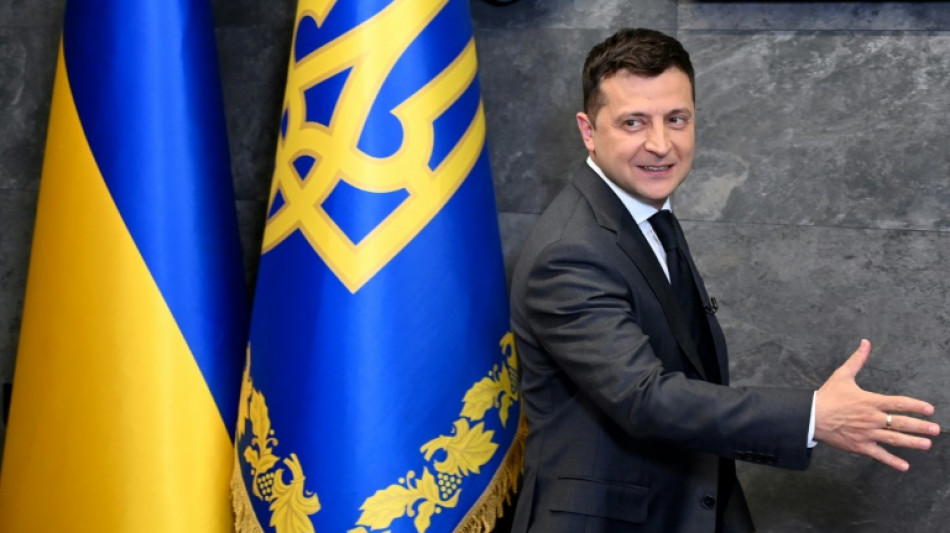

Ukraine's comedian-turned-president stars in crisis
He was the comic from Ukrainian TV who implausibly became president.
But Volodymyr Zelensky could be having the last laugh as Russia begins pulling back forces from Ukraine's frontiers without staging an attack -- just as he had told Washington they would.
The fresh-faced 44-year-old became president of Ukraine in time to witness the gravest standoff between the Kremlin and Western powers since the end of the Cold War more than three decades ago.
He watched Russia surround his country with more than 100,000 soldiers and Washington warn in increasingly shrill tones that a war was "imminent" and could begin "any day".
Zelensky took it all in and did what he knew best: he told his nation of more than 40 million people to relax and plan a party.
"What should we do? Only one thing -- keep calm," he said last month.
"We will celebrate Easter in April. And then in May, the same as always -- the sun, holidays, barbeques," he said. "And before long, it's summer."
Then he declared February 16 -- the day some US officials picked as a possible start for President Vladimir Putin's assault -- a national "unity day" holiday on which people should come out with flags and balloons.
- 'Not that bad' -
Zelensky ran for president seemingly as a joke in 2019.
He catapulted to fame by playing a foul-mouthed school teacher on TV who became president after one of his students filmed his profane rant against corruption and posted it online.
The evening comedy show became a huge hit just as the country was gripped by cataclysmic change.
Ukraine's 2014 pro-EU revolution ousted a Kremlin-backed leader and brought in a new team that had to grapple with a spiralling conflict in the east and an economy teetering toward collapse.
Ukrainians watched the president on the comedy show make crude jokes to his wife and pedal to work with a startled look of panic.
It captured the zeitgeist -- and made Zelensky a small fortune.
He defeated Petro Poroshenko -- an incumbent mired by crises on all sides -- in a runoff by winning more than 70 percent of the vote.
But some Ukrainians braced for the worst. His critics compared him unfavourably to celebrity politicians such as Italy's Silvio Berlusconi and then US president Donald Trump.
His early decision to fill his team with members of his Kvartal 95 TV production company did little to build public confidence.
Zelensky's initial media appearances with other world leaders looked stilted.
"I think our international partners have a fairly difficult time dealing with him. He is not on their level," said Ukrainian political analyst Mykola Davydyuk.
"They are playing at a very high level that he cannot reach -- and cannot understand."
But some Western diplomats appear taken by his charm.
"He hasn't done that bad, to be honest," one diplomat said.
"He has an impossible job. He is stuck, under pressure from both the Russians and the Americans," the diplomat said.
"He has shown composure."
- Defining moment -
The standoff with Russia over Ukraine's dream of joining NATO -- aspirationally written into the constitution but unlikely to happen in the coming decades -- could well define Zelensky's presidency for the coming years.
He came to power attempting to open lines of communication with Putin that could finally resolve the bloody separatist conflict after claiming more than 14,000 lives.
The two held a Parisian summit a few months after Zelensky's election that Putin hailed as an "important step".
But Zelensky read from a different script at his own post-summit media event.
"My counterparts have said it is a very good result for a first meeting. But I will be honest -- it is very little," he said.
Relations between the two men have been deteriorating ever since.
Putin has accused Zelensky's government of "discriminating" against Russian-speakers and reneging on past promises for settling the eastern conflict.
Zelensky's offer of a three-way summit with Putin and US President Joe Biden fell on deaf ears in Moscow last month.
But some analysts think Zelensky's stature has grown in the past few weeks.
"If Russia doesn't escalate and reduces its posture near Ukraine, it will likely be a little embarrassing for the US intelligence community, but it will also bolster Zelensky's position," the Foreign Policy Research Institute's senior fellow Rob Lee said.
"He didn't back down and NATO defence support increased."
G.Tomaselli--LDdC



